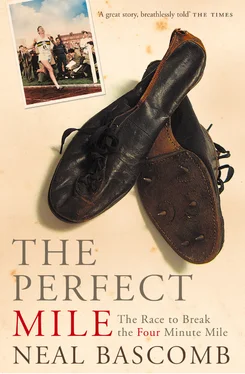After the race he met Jack Lovelock, the gold medallist in the 1,500m at the 1936 Olympics and the former world record holder in the mile. ‘You mean the Jack Lovelock,’ Bannister said on being introduced. Lovelock was a national hero, Exeter graduate, doctor, and blessed with tremendous speed. It didn’t take much insight on his part to see in Bannister the potential resurrection of British athletics.
Bannister didn’t disappoint. On 5 June he clocked a 4:24.6 mile, beating the time set by his hero Wooderson when he was the same age, 18. In the summer Bannister travelled with the English team on its first post-war international tour, putting in several good runs. In November he was selected as a ‘possible’ for the 1948 Olympics, then turned down the invitation. He wasn’t ready, he decided, to some criticism.
It was in his nature to listen to his own counsel, not that of others. He had taken a coach, Bill Thomas, who had once trained Lovelock, but Bannister soon became disgruntled with him. Thomas attended to Bannister on the track while wearing a bowler hat, suit and waistcoat. He barked instructions at the miler on how to hold his arms or how many laps to run during training. When the young miler asked for the reasoning behind the lessons, Thomas simply replied, ‘Well, you do this because I’m the coach and I tell you.’ When Bannister ran a trial and enquired about his time, Thomas said, ‘Oh, don’t worry about that.’ Soon Bannister dropped him, preferring to discover for himself how to improve his performances.
The next year he became Oxford Athletic Club secretary, then quickly its president. He won the Oxford versus Cambridge meet for the second year; he competed in the Amateur Athletic Association (AAA) championships in the summer, learning the ropes of first-class competition. Increasingly the newspapers headlined his name. He even saved the day at the opening ceremony for the Olympics when it was discovered that the British team hadn’t been given a flag with which to march into the stadium. Bannister found the back-up flag, smashing the window of the commandant’s car with a brick to retrieve it.
Four years later, he intended to save the British team’s honour again.
Roger Bannister’s preparations for the Helsinki Games began in the autumn of 1950. He had spent the two previous years studying medicine, soaking up university life, hitch-hiking from Paris to Italy, and going on running tours to America, Greece, and Finland. His body filled out. He won some races and lost others but, importantly, he turned himself from an inexperienced, weedy kid into a young man who clearly understood that Oxford and running had opened up worlds to him that otherwise would have remained closed. He was ready to make his Olympic bid, and afterwards to put away his racing spikes for a life devoted to medicine.
Bannister’s plan was to spend one year competing against the best international middle-distance runners in the world, learning their strengths and weaknesses and acclimatising to different environments. Then, in the year before the Games, he would focus exclusively on training to his peak, running in only a few races so as not to take off his edge. The plan was entirely his own. Having spoken to Lovelock about his preparations for the 1936 Olympics, Bannister felt he needed no other guidance.
First he flew to New Zealand over Christmas for the Centennial Games, where he beat the European 1,500m champion Willi Slijkhuis and the Australian mile champion Don Macmillan, both of whom he was likely to face in Helsinki. His mile time was down to 4:09.9, a reduction of more than forty seconds from his first Oxford race three years earlier. While in New Zealand he visited the small village school Lovelock had attended, noticing that the sapling given to the Olympic gold medal winner had now grown into an oak tree. The symbolism wasn’t lost on him. Back in England Bannister continued his fellowship in medicine through the spring of 1951 at Oxford, where he investigated the limits of human endurance and chatted with such distinguished lecturers as J. R. R. Tolkien and C. S. Lewis. He then flew to Philadelphia to compete in the Benjamin Franklin Mile, the premier American event in middle-distance running. The press fawned over this foil to the American athlete, commenting on his travelling alone to the event: ‘No manager, no trainer, no masseur, no friends! He’s nuts – or he’s good.’ In front of forty thousand American fans, Bannister crushed the country’s two best milers in a time of 4:08.3. The New York Herald Tribune described him as the ‘worthy successor to Jack Lovelock’. The New York Times quoted one track official as saying, ‘He’s young, strong and fast. There’s no telling what he can do.’
The race brought Bannister acclaim back home. To beat the Americans on their own turf earned one the status of a national hero. When he followed with summer victories at the British Games and the AAA championships, it seemed track officials and the press were ready to award him the Olympic gold medal right then and there. They praised his training as ‘exceptional’, an ‘object lesson’. Of his long, fluid stride, the British press gushed that it was ‘immaculate’ and ‘amazing’. He left rivals standing; he was a ‘will-o’-the-wisp’ on the track. After a race that left the crowd laughing at how effortlessly Bannister had won, a British official predicted, ‘Anyone who beats him in the Olympics at Helsinki will have to fly.’
Then the positive press turned quickly to the negative. Following his own plan, Bannister stopped running mile races at summer’s end. Tired from competition, he felt he had learned all he needed during the year and should now dedicate himself to training. When he chose to run the half-mile in an international meet, the papers attacked: ‘Go Back to Your Own Distance, Roger’. This was only the beginning of the criticism, but Bannister remained focused on his goal.
To escape the attention, he journeyed to Scotland to hike and sleep under the stars for two weeks. One late afternoon, after swimming in a lake, he began to jog around to ease his chill. Soon enough he found himself running for the sheer exhilaration of it, across the moor and towards the coast. The sky was filled with crimson clouds, and as he ran, a light rain started to fall. With the sun still warming his back, a rainbow appeared in front of him, and he seemed to run towards it. Along the coast the rhythm of the water breaking against the rocks eased him, and he circled back to where he had begun. Cool, wet air filled his lungs. Running into the sun now, he had trouble seeing the ground underneath his feet, but still he rushed forward, alive with the movement. Finally spent as the sun disappeared from the horizon, he tumbled down a slight hill and rested on his back, his feet bleeding but feeling rejuvenated. He had needed to reconnect to the joy of running, away from the tyranny of the track.
Throughout the winter of 1951–2, Bannister immersed himself into his first year of medical school at St Mary’s Hospital in London, learning the basics of taking a patient history and working the wards. He was, by the way, also training for the Olympics. By the spring he had developed his stamina and began speed work on the track. When he announced that he wouldn’t defend his British mile championship, the athletics community objected. It was unthinkable. He had obligations to amateur sport; he had to prove he deserved his Olympic spot; he must take a coach now; he couldn’t duck his British rivals. Bannister made no big press announcements defending his reasons, he simply stuck to his plan, trusting it. As isolating as this plan was, so far it had taken him exactly where he wanted – so far. Meanwhile, most other athletes trained under the guidance and direction of the British amateur athletics officials.
Читать дальше












